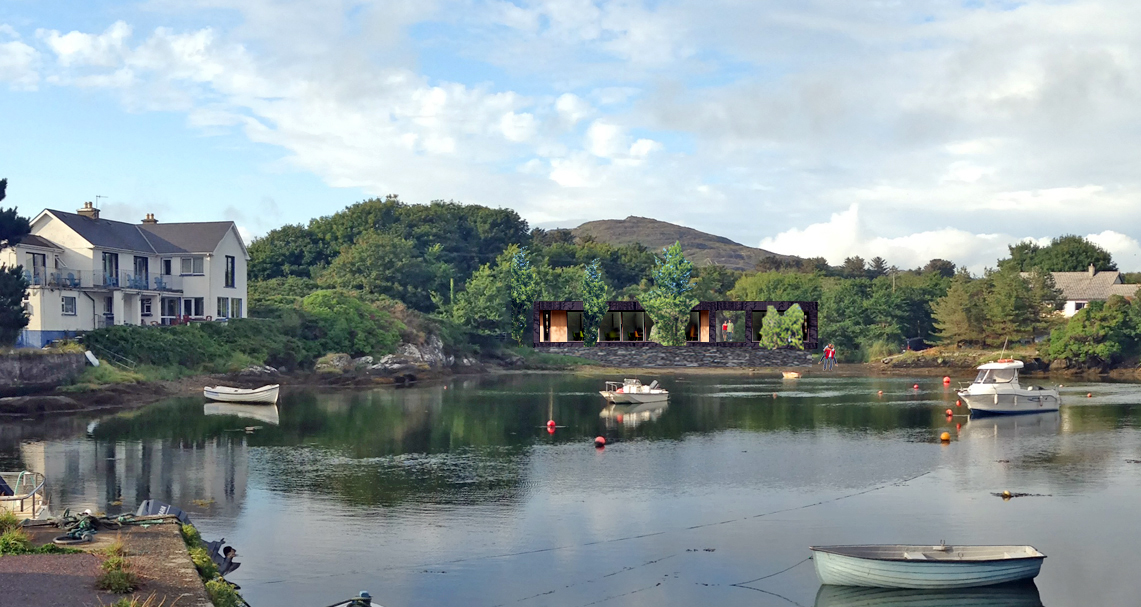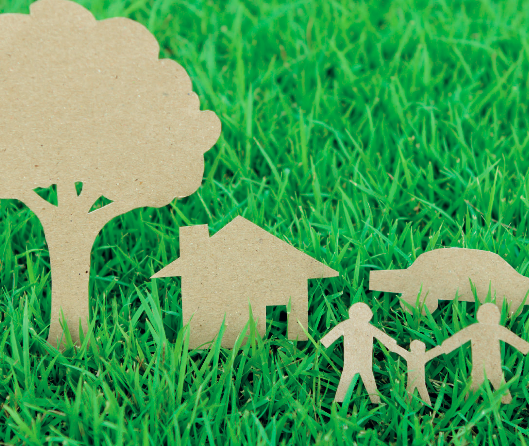Our autumn issue is out now. In it, we chat to the folks behind Goleen Harbour. Dive on in to find out more…
Bio-Diversity
Living in an Eco Neighbourhood – The Cloughjordan Community in Ireland, by Davie Phillip
Living in an Eco Neighbourhood
By Davie Phillip
A peek inside the Cloughjordan Community
In this regular column, Davie Philip from ‘Cultivate’ explores how we make the transition to a more sustainable way of life, one that is community based, ethical, healthy and resilient.
For the last two years of this column, I have been exploring how we can make our communities better places to live and how we might develop the resilience to cope and adapt to the challenges ahead. I’ve looked at cooperative approaches to creating livelihoods and growing food, explored how we nurture healthier approaches to living together and introduced tools to make the transition to a better world.
Most of the things I have been talking about here in Positive Life are being applied and developed in the small village of Cloughjordan where I live and work. Although I often refer to the Ecovillage project in these articles, I have never really introduced what is actually going on in this little corner of North Tipperary.
Cloughjordan
Cloughjordan is a heritage village located less than two hours from Dublin and is reachable by train. In the past the village had suffered from population decline and some of its key services were under threat before the ecovillage project first arrived in 2003.
The project has now attracted over 65 families to move to Cloughjordan contributing to the flourishing of the whole village and is now seen as one of the healthiest communities in Ireland. In the last two years, it has won the National Green Community Award, in 2012 was voted runner up in an ‘Irish Times’ contest looking for the ‘Best Place to Live in Ireland’ and this year has been nominated for an Irish Pride of Place award and a UN award for liveable communities.
Eco-neighbourhood
The term ecovillage is actually a little misleading, as we are very much a neighborhood that is experimenting with good practice in community regeneration. Our main pedestrian entrance is in the centre of Cloughjordan’s Main Street. The ecovillage is a mixed-use development and is being developed by Sustainable Projects Ireland, a registered educational charity and national NGO.
I was one of the first members of the project way back in 1999 a few years after I got into sustainability. The first meetings of the original members took place in the Dublin Food Coop where many of us were active, and the principles of cooperatives are core to our objectives. Our purpose is to develop a sustainable community that can serve as an education, enterprise and research resource for all.
Permaculture
We used a design system called ‘Permaculture’ to integrate the buildings, woodlands, agriculture and renewable energy elements within a living community on the 67 acre estate. Zoning for sustainable development and planning permission for 3 community buildings and 130 homes was granted in 2005, which included 16 live-work units to encourage livelihoods where people are living. Work began on the infrastructure in February 2007 and construction of the first homes began in March 2009. By March 2013 fifty households had moved into the eco-neighbourhood.
Energy
The energy performance of all the homes are well above the national average. Ireland’s only renewable energy district heating system has been installed, which includes the largest array of solar panels in Ireland. This has made significant savings of energy and a reduction in CO2 use.
Woodlands & Bio-Diversity
In one third of the estate 17,000 trees, mostly oak and ash were planted in 2011 and this will grow to become a community woodland. A Community orchard has been developed and an Apple Tree Walk with 78 different varieties of heritage apple trees from Irish Seed Savers included. Over 1000 heritage apple trees were also planted around the houses of the ecovillage as part of the edible landscape – this combines fruit and nut trees, berry bushes and herbs and will create privacy as well as producing a yield for residents. This is also essential for encouraging biodiversity.
A biodiversity loop walk through the ecovillage estate has recently been developed too. The route traverses the wildlife corridors, mature hedgerows, the woodlands and the orchards. These green areas provide space for research and education as well as providing recreational amenity for residents.
Community Farm
The Cloughjordan Community Farm is the Community Supported Agriculture (CSA) project based in the ecovillage and members engage in many aspects of running the farm. This empowering initiative ensures work for three food producers and secures a supply of healthy and locally grown food to 60 families – two-thirds from the ecovillage and one third from the rest of Cloughjordan. The Cloughjordan Wood Fired Bakery is located in the ecovillage and bakes over 1000 loaves a week. It is fuelled locally through harvesting from the adjacent Knockanacree woodlands and is available from Blazing Salads.
Entrepreneurship
WeCreate is our the new co-working space for the eco-entrepreneur and gives small businesses, sole traders, artists and craftspeople access to a hot-desk environment to work from. WeCreate will also give the community access to open source software and prototyping technologies to create designs that can then be fabricated by computer controlled cutting, milling and 3D printing machines in the Community FabLab.
Education
There is a large area that contains the resident’s allotments, a community chicken coop and a community garden in a polytunnel. The Research Education and Development (RED) Gardens are also located here. This is made up of five vegetable gardens exploring the answers to a simple question: What is the best way to grow food?
Cloughjordan really provides an excellent destination for ecological and place-based learning, offering a unique opportunity for people to come and learn by immersing themselves in community and the systems of sustainability. An EcoLearn programme of courses, workshops and fieldtrips is already popular and Django’s eco hostel on site allows for residential courses. Two national NGOs, FEASTA: The Foundation for the Economics of Sustainability, and Cultivate Living and Learning, the cooperative I do most of my work through, have relocated to the ecovillage and both contribute to the programme of educational events held throughout the year.
Community
Neighbours come together for a ‘meitheal’ most weekends in the ecovillage. This is an Irish word for a work party and conveys the sense of community spirit in which people get things done together. The initiative is also groundbreaking in that it uses a combination of shared-out responsibilities and consensus decision-making in its organisational structures. Much of the work of running the project is shared out amongst members on a voluntary basis.
Sharing facilitates community relations, we share tools, land and every week there is an option of a shared community meal. There is a lot of intergenerational activity and it is common to see a large group practicing tai chi or riding their unicycles on the market square at the centre of the ecovillage.
I love being in the ecovillage. I sometimes say it is the longest and most expensive self-development course I have ever taken. There is a rich learning when a community of people comes together to pioneer a different way of doing things. Through the interaction and working with others I am learning so much about myself and the environment of this eco-neighborhood is healthy for our own and our families’ development. This small Irish community is developing its resilience to adversity as well as being a great place to live.
See www.thevillage.ie for details on tours, organising a group visit or opportunities for living here.
Davie Philip is a facilitator and trainer who manages the Community Resilience programme at Cultivate Living and Learning. He is based at the Cloughjordan Ecovillage and is a board member of GIY Ireland. davie@cultivate.ie



